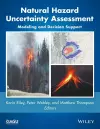
Natural Hazard Uncertainty Assessment
3 contributors - Hardback
£130.95
Dr. Karin Riley is a Research Scientist in the Numerical Terradynamic Simulation Group in the University of Montana, Missoula, Montana. Her research interest focuses on the calculation of risk to terrestrial carbon stocks and expected emissions for the continental US, tree-level spatial model for the continental US, modeling of change in burn probabilities under climate change, and validation of FSim Large Fire Simulator’s national burn probability and flame length outputs.
Dr. Peter Webley is the Research Assistant Professor at the Geophysical Institute in the University of Alaska Fairbanks. His research interests lie in volcanic ash cloud and plume detection through thermal and visible remote sensing as well as volcanic ash cloud modeling using Lagrangian transport and dispersion models. Given his background in thermal and radar based remote sensing, he also has an interest in real-time detection of ground based volcanic activity through remote sensing datasets and how to sue these for hazard assessment and risk mitigation. Through his research projects and collaborations, Dr Webley works closely on with both groups across UAF as well as further afield in the USGS, NASA, NSF, State University of New York - Buffalo, Michigan Technology University. Within the University of Alaska Fairbanks, Dr Webley is the UAF Faculty Senate Research Advisory Committee co-chair as well yearly he provides an instructional two-week module for the Alaska Summer Research Academy. Outside Alaska, Dr Webley is the America's and Caribbean chair for the World Organization of Volcano Observatories and on the Steering Committee of the Global Volcano model project.
Dr. Matthew Thompson is a Research Forester at the USFS Rocky Mountain Research Station in Missoula, MT. His research interest lies in application of principles from systems engineering, industrial engineering, risk analysis, operations research, economics, and decision-making under uncertainty to complex resource management with economic and environmental objectives.